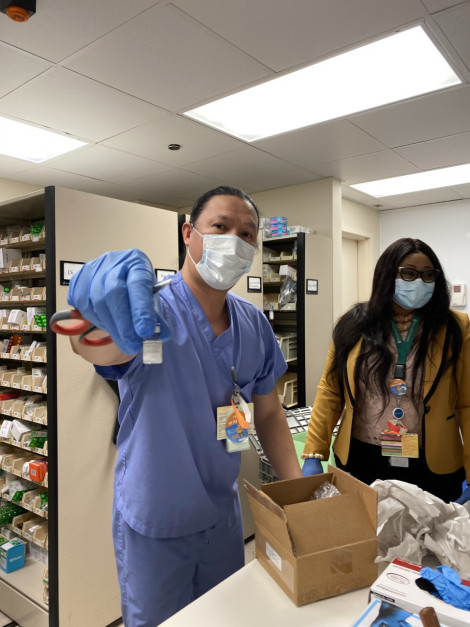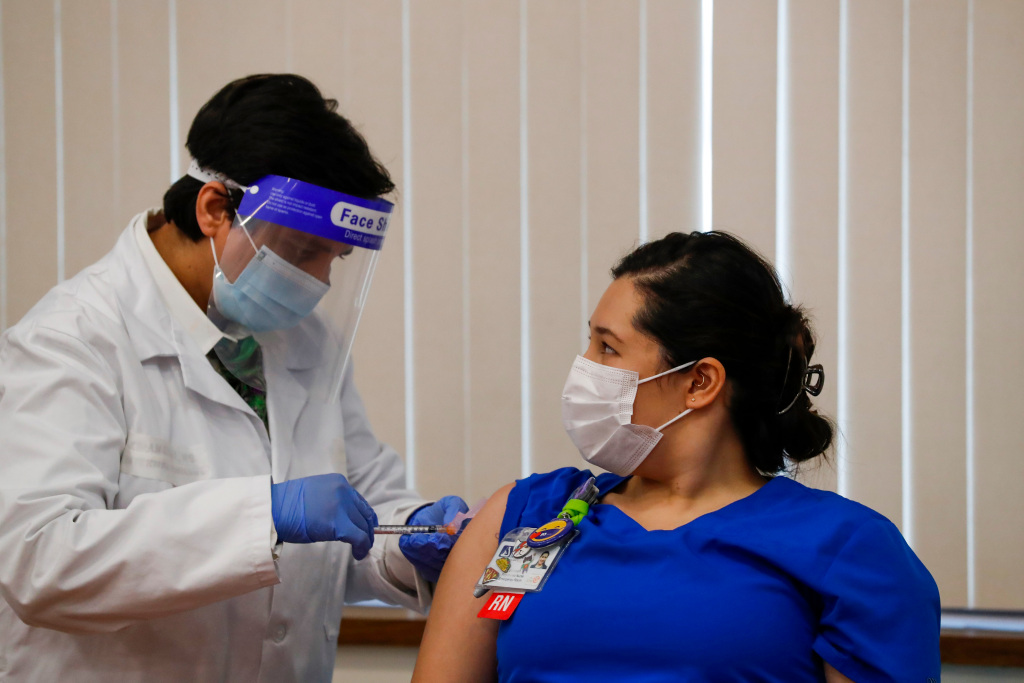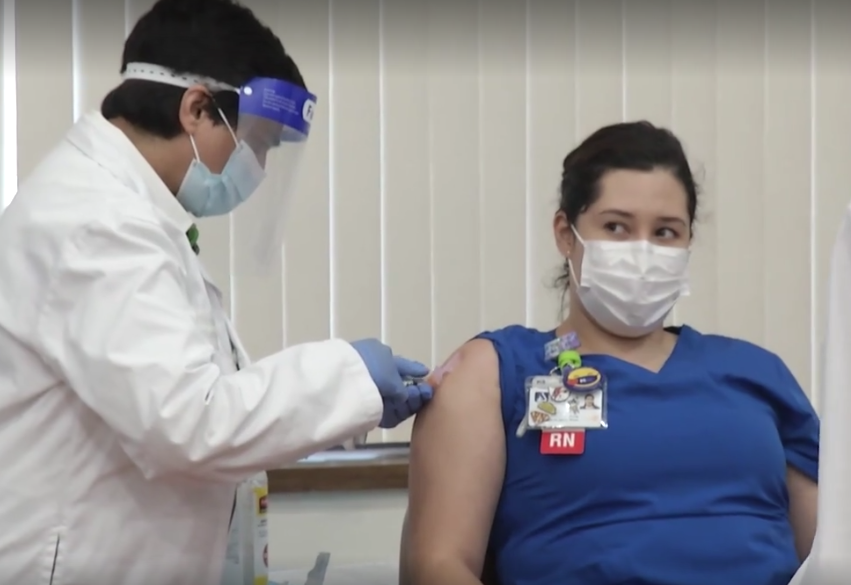-
Chicago’s First Coronavirus Vaccine Given To Doctor At Loretto Hospital: ‘The Beginning Of What Will Be An End’ Of COVID-19

Doctor Marina Del Rios from UI Health receives Chicago's first COVID-19 vaccination from Dr. Nikhila Juvvadi on Tuesday, Dec. 15, 2020, at Loretto Hospital, a 122-bed medical facility in the Austin neighborhood. (Jose M. Osorio/Chicago Tribune/pool)
Tuesday morning's vaccine kicks off what officials say will be a year-long effort to get as many people as possible vaccinated in Chicago to end the COVID-19 pandemic.
AUSTIN — Chicago’s vaccination campaign has officially begun, marking the beginning of the end of the pandemic, officials said.
The city gave its first dose of Pfizer’s coronavirus vaccine to doctors, nurses and a patient care technician Tuesday morning at Loretto Hospital. It kicked off what officials say will be a year-long effort to get as many people as possible vaccinated in Chicago to end the COVID-19 pandemic.“This is, I fully believe, the beginning of what will be the end of COVID-19 here in Chicago,” said Dr. Allison Arwady, head of the Chicago Department of Public Health.
Officials livestreamed health care workers as they received the first doses. You can click here to watch.
“What we just witnessed is history in the making. It’s a milestone in our city’s history,” Mayor Lori Lightfoot said at a news conference. “We’ve been preparing for this moment for months, and it’s important that we’ve taken this initial step in moving our city forward and, hopefully, out of this terrible pandemic that has caused so much harm and heartache for many.”
The first vaccines arrived in Chicago Monday. CHICAGO DEPARTMENT OF PUBLIC HEALTH
The city received just 23,000 doses of the Pfizer vaccine to start, and it estimates there are 400,000 health care workers who will be prioritized for the vaccine. But more doses will be shipped in weekly, and doses from other vaccines — like Moderna’s, which is expected to be approved soon — will shore up Chicago’s supply, officials have said.
Still, supply will remain far too low to meet the high demand. Vaccines won’t be available to the general public for months.
Officials said people should keep following safety measures — like wearing a mask, practicing social distancing and celebrating the holidays virtually — to slow the virus’s spread and save lives.
“Widespread community distribution of the vaccine is still months away,” Lightfoot said. “While this is an important and hopeful moment, … we are still in the tunnel. We still have places in our city where this terrible virus is ravaging the body, the mind and the spirit of so many.”

Elizabeth Zimnie (center), an ER nurse at Norwegian American Hospital, receives the COVID-19 vaccination administered by Dr. Abha Agrawal (left), chief medical officer at Norwegian American Hospital at Loretto Hospital in Chicago on Tuesday, Dec. 15, 2020. JOSE M. OSORIO/CHICAGO TRIBUNE/POOL
The choice of Loretto Hospital for the first vaccination was significant: The hospital is on the West Side and serves many low-income people and people of color — which are the populations hit hardest by the pandemic and its economic fallout.
“The fact that we are one of the first to get the vaccination is recognition that life has not always been fair for African Americans because of the disparities and inequities that exist,” Loretto Hospital President George Miller said Monday.
Equity will be at the heart of Chicago’s vaccination campaign, Lightfoot and other officials said. Chicago’s Latino and Black communities have been hit hard by the pandemic and seen a disproportionate number of deaths and cases.
The city will have flexible vaccination plans so it’s easier for all people to get a dose, officials said. And they will use demographic data to track that people of all races and ethnicities are being given access to the vaccine, Lightfoot and Arwady said.
“Equity isn’t part of our COVID-19 strategy; it is our strategy,” Lightfoot said. “And when it comes to our vaccine rollout, we will be leaving no one behind.”
The state’s vaccination efforts — which will focus on all of Illinois outside Chicago — started shortly after, at 11 a.m.
Already, Chicago has seen at least 3,805 people die from COVID-19 and 185,883 confirmed cases. More than 14,000 people have been killed by COVID-19 throughout Illinois.
But officials know they’ll have to counter skepticism about the vaccine from some people.
Arwady emphasized officials have not skipped any safety steps in testing and approving the vaccine, and they would not approve something that had not been properly vetted. Officials have repeatedly said no serious side effects have been reported in trials.
To build trust in Black and Latino communities, the city will build up outreach and engagement efforts and partner with “trusted messengers” who will share accurate information about the vaccine, officials previously said.
State and city officials said they have no plans to require the vaccine.
For now, COVID-19 vaccines are being prioritized for health care workers and people living and working in long-term care facilities; they will not be available to the general public for months.
But, over the months, the campaign will grow. More vaccine doses will be delivered to Chicago weekly, and doses from other vaccines — like Moderna’s — will start coming in and being used if they’re approved federally.
RELATED: Coronavirus Vaccine Coming To Chicago This Week: Here’s How The City Plans To Distribute It
The city will distribute the first 23,000 vaccine doses among Chicago hospitals, which will then vaccinate health care workers. Hospitals are expected to give priority to people working directly with COVID-19 patients.
Residents and staff in long-term care facilities will also be prioritized in coming weeks. The city is partnering with organizations like Walgreens to vaccinate people in those facilities. Arwady previously said she expects vaccines to begin going out to all long-term facilities in the city by the second or third week of the campaign.
Then, starting in late December or early January, the city will start setting up mass vaccination sites where health care workers can go to be vaccinated, Arwady said. They’ll be aimed at workers who aren’t employed at hospitals and will be appointment-only.
“Much further down the line,” possibly in late March, the city expects to be able to start vaccinating essential employees, people older than 65 and people with underlying medical conditions, Arwady said.
A federal committee will determine who falls into the “essential worker” category and how members of that group are prioritized — if teachers should be vaccinated before grocery workers, for example.
Once that happens, the city will still run its mass testing sites, but it will also provide vaccine doses to partners like doctors and pharmacies so people can get vaccinated at those places, Arwady said.
Arwady said she isn’t sure when wider vaccination would be available to people who don’t fall into those categories, as so much depends on the availability of vaccine doses.
“I can tell you just very high level, the city of Chicago is broadly anticipating that we may be in the direct vaccination business for about six months,” Arwady said. “We’re hoping that in about six months there will be enough widespread vaccine that it will be very widely available. We won’t need to be doing more of those vaccination sites, etc.”RELATED: A Coronavirus Vaccine Is Coming. Here’s Everything You Need To Know About Getting One In Chicago
Do you like this page?













